Did we just enter a new climate? Recent heat, rains, and violent storms struck around the world. Meteorologist & storm-chaser Bob Henson covers extreme weather for you. As big oil and gas pump out more death – We should sue them! West Coast environmental lawyer Andrew Gage explains how. Plus the harsh truth from UK scientist Kevin Anderson. Welcome back to a new season of Radio Ecoshock.
Listen to or download this Radio Ecoshock show in CD Quality (57 MB) of Lo-Fi (14 MB)
Climate “concern” was 20 years ago. Ten years ago scientists “worried“. Now it’s definitely time to panic. Every sign points to a new climate regime on Planet Earth, and you are not going to like it. A new study
by Joshua Pearce, University of Western Ontario, finds a billion people could die if global warming reaches 2 degrees C over pre-industrial. That 2 degrees is expected this century, possibly by 2070 on our current path.
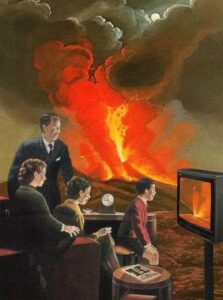
Nobody can track all the jaw-dropping extremes popping up around the world, north and south, pole to pole. During the Northern Hemisphere summer, record-smashing heat warped the Southern United States and the far north in Canada and Alaska. More northern forests burned this year than ever before, emitting a big burst of carbon into the atmosphere, to add more warming. China had it’s month of too-hot-to-go-outside punishment. That bedeviled Japan until a few days ago. Excess deaths, counted later, will reflect these times. According to Deutche Welle news, this year Japan recorded it’s hottest summer, Australia it’s warmest winter, and for India, the hottest, driest August on record.
IMAGE CREDIT: Joe Webb https://www.joewebbart.com/
EUROPE: EVERYTHING BUT NORMAL
Europe had a mixed bag of everything but normal. Saharan heat flowed up into Spain, Portugal, Italy and Greece. On August 23rd, France had the hottest August day on record. Switzerland broke it’s all time high, and so did Milan The largest wildfire ever recorded in the European Union is still burning in Greece as we go to air. But Northern Europe stayed cooler above the heat band, with occasional flash floods and even odd snow in the Alps.
North Africa and the Middle East were Inhumanly hot for months, with temperatures reaching and exceeding 50 degrees C., over 122, nearing world records. But the heat did not stay in the northern hemisphere. Parts of the south got summer heat in winter. It was over 35 degrees in Bolivia, at altitude, in winter. At the end of August, Perth Australia set an absolute record for winter highs, and so did South Africa.
We’ll explore why and what this means later in the program. First, let’s get a review from a proper expert.
EXTREME WEATHER TRACKER:
BOB HENSON
The summer of 2023 was a nightmare of record heat, wildfires, and floods around the world – but not everywhere! From headline hurricanes to extreme heat, American author and journalist Bob Henson tracks it all.
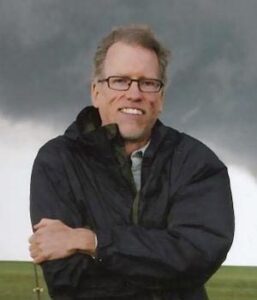
Bob Henson’s work pops up everywhere. He produced award-winning news and reports for the National Center for Atmospheric Research (NCAR). His articles appear in Nature, Scientific American and more. Bob wrote and produced quick weather updates for radio called “The Weather Notebook”. Over his decades of journalism, Bob sees the science, the stats, and the history of extreme weather unfold.
I had to interrupt Bob as he worked over Hurricane Idalia.
Idalia rapidly intensified ahead of landfall. Expect more of the same in a warming world.
Listen to or download this interview with Bob Henson in CD Quality or Lo-Fi
THE HEAT!!
The month and a half of punishing heat in the U.S. South is harder to show on TV news than a hurricane. But heat kills more Americans than storms and certainly damages crops and living things. Are we underestimating the record heat in the U.S. South in 2023?
Strangely, the Pacific Northwest was not that hot this summer, except for a couple of bouts. We have seen worse, like the 2021 heat dome. But further north, in the Northwest Territories, Yukon and Alaska – they set all-time heat records. As Bob Henson explained it to me in email, and in our interview:
“One thing I’d like to touch on, along with the obvious serious effects of the utterly record-smashing heat in places like Phoenix and Baton Rouge, is the “ring of fire” aspect in North America this summer – how the record heat has been most dramatic along the southern tier of the nation, and in Canada, while places in and near the Midwest haven’t had as much record summer heat. Oddly enough, the US only had its 11th warmest July on record (see attached map) even though it was the warmest July globally, and the US through July was having only its 16th warmest year on record, even though the planet is at or near its hottest year to date on record.”
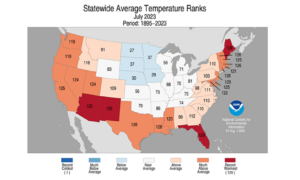
The big story in British Columbia and the western boreal forest is record-smashing wildfires. They forced evacuation of 2 cities and more than doubled Canada’s greenhouse gas emissions. Most of the big fires are still burning out of control in September. Firefighting spokespeople say nothing can stop them until the snow buries the flames, possibly late into this winter.
FIND BOB HENSON
Keep posted on Bob’s latest weather watch and predictions here at yaleclimateconnection.
Or if you still use Twitter/“X”: Bob is at @bhensonweather
Read Bob Henson’s two books: “The Thinking Person’s Guide to Climate Change” and “Weather on the Air: A History of Broadcast Meteorology.”
Bob has appeared on Radio Ecoshock in 2016, 2017 and 2018.
VAPOR PRESSURE DEFICIT
Scientists say climate change leads to bigger, more beastly wildfires partly due to something called “vapor pressure deficit”. See also: “California’s Thirsty Future: The Role of Vapor Pressure Deficit in Our Changing Climate and Drought”
What Is Vapor Pressure Deficit (VPD) and What Is Its Connection to Wildfires?
California’s Thirsty Future: The Role of Vapor Pressure Deficit in Our Changing Climate and Drought
WHAT IS YOUR TRIGGER?
Covering extreme news as we do, I find small stories can finally trigger a reaction, a gasp, a feeling things have really changed. The first this summer: reports that homeless people in Phoenix arrived in Emergency Wards with Third Degree burns from touching the pavement. Cities can become too hot for human survival outside the grid. That is the South now, isn’t it?
Another single bit in a torrent of new heat records: New Orleans experienced the hottest day ever in it’s long record of heat. It’s always hot there, but this was nuts! On August 27, the actual temperature was 105 degrees Fahrenheit or 40 degrees C. That is a full two degrees hotter than the previous record. It does not include the “feels-like” heat index with legendary Louisiana humidity. What surprised or triggered you this summer?
We talked about the persistent belt of heat across the U.S. south this summer. Then there was a heat dome over the Mid-West. At the very same time, a strong heat dome appeared over parts of Europe, and Japan roasted setting new records. Are these heat domes setting up due to a slow meandering Jet Stream, planetary waves or what?
Former NASA head scientist James Hansen recently warned NEXT year, 2024 will be even worse. According to records of past strong El Ninos, more heat comes the following year, like 2024 if this El Nino is strong.
=============================
ANDREW GAGE: SUE BIG OIL!
In it’s worst wildfire season ever, Canadians evacuated a big Arctic territory and urban areas of British Columbia. Meanwhile fossil fuel producers make billions in profits as they invest in more climate chaos for decades to come. That’s not right. We should sue them. In the United States and Canada, local governments are suing big oil and gas for billions in damages.
In the United States, 40 local and state governments are suing fossil fuel companies for damages caused by climate change. In Canada, West Coast Environmental Law is leading the charge to make fossil fuel producers pay up. Environmental lawyer Andrew Gage coordinates the Sue Big Oil campaign.

Listen to or download this 19 minute interview with Andrew Gage in CD Quality or Lo-Fi

West Coast Environmental Law says in a late August press release:
“Scientists keep telling us that our communities are paying the price for oil, gas and coal-fueled climate change, while Shell, Chevron, Exxon and other fossil fuel giants pocket record profits,” said Andrew Gage, Staff Lawyer, West Coast Environmental Law. “Earlier this year, Shell and BP reneged on their promises to reduce greenhouse gas emissions because they were just making too much money from oil and gas – and now Kelowna and Yellowknife are having to evacuate as a result of wildfires. Until fossil fuel companies are forced to pay for the damage they cause, they’re going to keep making decisions that harm the planet.”
When cities like Yellowknife or West Kelowna evacuate it costs someone billions of dollars. Business shuts down, fire-fighting budgets go through the roof, the military comes in, tens of thousands of people have to be fed and housed. Then the super-high costs of rebuilding kick in. A lot of that big money comes from taxpayers. But oil and gas companies who caused these disaster pay nothing for damages or rebuilding. That is what this lawsuit seeks.
There are relationships between public awareness of the tobacco-cancer link, followed by liability suits, and public awareness of the fuels-climate damage link and legal action. Andrew gives us a quick thumbnail of climate damage lawsuits against fossil fuel companies in the United States. Many of the early suits went nowhere because oil and gas companies disputed the abilities of states or local governments to sue them, as federally regulated enterprises. That is not a problem in Canada or other countries. See: “Why Us Climate Lawsuits Against Big Oil Matter In Canada” by Andrew Gage.
Along with UBC Law Professor Michael Byers, Andrew Gage also looked at “The Internationalization of Climate Damages Litigation”. I ask him how is this legal front developing internationally, and is there any hope for climate justice from existing International Law?
LAW BACKED BY SCIENCE: AMMUNITION
West Coast Environmental Law says a legal case can be backed by science. Two studies came from experts employed by the Union of Concerned Scientists. In 2017 Brenda Ekwurzel lead the paper titled “The rise in global atmospheric CO2, surface temperature, and sea level from emissions traced to major carbon producers.” That was followed in 2019 by Rachel Licker’s look: “Attributing ocean acidification to major carbon producers.”
Also in the science arsenal, there is the 2018 paper from Megan Kirchmeier-Young at the Pacific Climate Impacts Consortium, at the University of Victoria. The title is: “Attribution of the Influence of Human-Induced Climate Change on an Extreme Fire Season.” Megan studied the record wildfire season in British Columbia in 2017 – over 1.2 million hectares burned – almost 3 million acres gone in one year. She found “that anthropogenic climate change increased the area burned by a factor of 7 [to]11 [times]”. What else is in your argument to make big oil pay?
The latest scientific “smoking gun” is a new paper published May 16, 2023 by Kristina Dahl and co-authors. Kristina says, quote:
“What we did in this study was attribute a portion of the increase in fire-danger conditions and cumulative burned area across the western US and southwestern Canada to emissions that you can trace back to 88 of the world’s largest fossil fuel producers and cement manufacturers.
What we found is that those fossil fuel producers and cement manufacturers are responsible for almost 40% of the area of western US and southwestern Canadian forests that has burned since mid-80s, and they’re responsible for about half of the increase in fire-danger conditions that’s happened over the last century.”
Find out more about this campaign at www.suebigoil.ca
Andrew was an environmental activist in B.C. After being arrested at the Clayoquot Sound roadblock to logging, he went back to university to become a lawyer. Andrew is also a member of the Society of Friends, also known as the Quakers. In the early days of Radio Ecoshock, I did a short piece on the gifts of the Quakers, from the Right to Assembly right up to inspiring and founding Greenpeace in Vancouver.
Click here to listen or download that 17 minute feature Green Quakers from early Alex Smith.
===============================
KEVIN ANDERSON TELLS IT LIKE IT IS (again)
What are the scientists thinking? This is Kevin Anderson, speaking in August 2023.
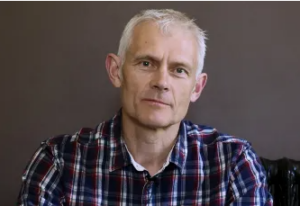
“If we think about where we’re heading, let’s be clear. We are over 30 years, 32 years now since the first major scientific report on climate change that came out in 1990. And so I think when we judge where we are heading, we have to say, “Well, what have we done since 1990?” Well, we’ve watched emissions go up year after year after year. They’re now over 60% higher per year than they were in 1990.
So there is lots that you will hear, lots of rhetoric, lots of good words, lots of optimism about the future. But given we’ve known about this subject and apparently been working on it for 30 years, the trend line tells us that we are heading towards three to four degrees centigrade of warming across this century. An absolute climate catastrophe, and it’s a catastrophe for all species, including our own. And so that’s the direction of travel.
Now, that direction of travel does not have to continue – but the current trend line tells us that all we are doing so far is giving rhetoric and optimism and greenwash – and not driving the levels of change that are necessary to stay within the 1.5 to two degrees framing of the Paris Agreement.”
Who is Kevin Anderson? For years he was deputy director of the top UK climate institution, the Tyndall Centre. Anderson literally advised government and the European Commission on climate change, while fostering key research. He is Professor of Energy and Climate Change, joint chair in the School of Engineering at the University of Manchester, and has worked with the Centre for Sustainability and the Environment (CEMUS) at Uppsala University in Sweden and the Centre for Climate and Energy Transformation (CET) at Bergen University, Norway. He thinks we are on the path to climate catastrophe while we pretend otherwise.
=============================
ALEX CONTINUES WITH MORE
JAW-DROPPING SUMMER 2023 EXTREMES
In previous shows, with experts like Matthew England and Jason Box, Radio Ecoshock has reported the ice world at both poles is in retreat at a frightening pace. The Antarctic Sea ice is so low we don’t know what is going on. With recent study, we know the great glaciers are melting at both pole. Sea level will rise more than predicted. Your coming headlines will be coastal towns and cities retreating after mass damages. The vast food producing deltas lost to salt will not be reported. The extinction of species from coral to micro-algae feeding the sea will not be televised.
But millions of people fleeing the heat, drought, fires and starvation will fill TV screens in wealthier countries. Nations perceived safer, or at least livable, will call it the “immigration crisis”. Please listen again to my interview with Gaia Vince. That’s in my April 26 show called “Nomad Century and Bad Banks”, available free at ecoshock.org.
THE SOUTHERN HEMISPHERE HEAT WAVE IN WINTER
Winter heat waves deserve more attention. This past July was the hottest every experienced in Brazil. In August it got worse, with temperatures soaring to 42 degrees C, 107 Fahrenheit in the shade in winter. According to weather historian Maximilian Herrera, the 45 degrees C recorded August 22 in Villamontes in Bolivia, “ties the highest temperature ever recorded in meteorological winter in the whole Southern Hemisphere.”
Also in the southern winter, record highs were set in South Africa, from Cape Town 32.9 C, 91 F – to Namibia. In our interview, Bob Henson mentioned the 30 degrees at Perth Airport in Australia, the hottest winter day in 79 years of record-keeping.
On all three continents people enjoyed the winter heat, nervously. Their coming summer looks ominous indeed, as El Nino really kicks in.
And that heat news is just from humans settlements on land. The global sea surface temperature anomaly is literally off the charts from anything we’ve ever seen. That means the ocean is hotter, on average, around the world, than ever before in human history. The North Atlantic is cooking, as is the Gulf of Mexico where sea temperatures near Louisiana reached 90 degrees C, hot-tub temperatures. One place off Florida measured sea temperatures higher than the human body, above 98.6 degrees F, 37 C. I can’t call a scientist to find out what that means. Nobody knows. This is a whole new experiment with a closely connected web of living things.
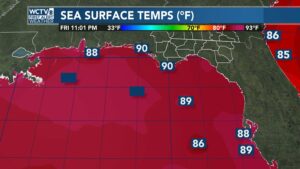
EXXONMOBIL ANNOUNCES CLIMATE FAILURE!
Who says we are going to fly well past the so-called guard rails of 1.5 degrees C or 2 degrees warming? Pretty well every major scientist of course. A majority of the public suspect it. But only the oil and gas industry can guarantee we go to catastrophe – and they do. One of the world’s largest oil and gas producers Exxon/Mobil says global climate goal are destined to fail. In late August the company released it’s report “ExxonMobil Global Outlook, Our view to 2050”.
The Exxon researchers foresee a 25 percent increase in world population and a doubling of the global economy by 2050. The company plans to be there all the way, selling profitable oil and gas right past 2050 to fill demand for what they call, quote “a reliable and lower-emissions source of fuel for electricity generation, hydrogen production, and heating.” Lower emissions than what?
It’s like the Mafia saying the neighborhood is growing and people are going to want more drugs, gambling and sex. They just fill demand, more safely than those other gangs. Where companies like British Petroleum once promised to go “Beyond Petroleum”, the oil and gas majors are spending trillions on more productions to last long into this century. Governments are not just helping. Governments are spending trillions of dollars to subsidize more drilling, more production. Fossil fuel addiction has taken over the global brain network.
As I have said before, most of us will stumble on somehow until we can’t. The universe will continue to reveal its secrets in fantastic galaxies and amazing new life. Love will not die. Art and song my flourish. The privileged few and the lucky will be glad to enjoy parts of life. We may be passing through a step-like transition, with a couple of years where disasters pause again, before the next jolt. We don’t know.
SUMMER WAS FINE HERE UNTIL…
This was a pleasant and productive summer for me. Although two cities next to our village almost burned down a month ago. In just a few hours, a massive wildfire roared out of the United States and ranged all along the hills above the desert town of Osoyoos. Then another flared up in the food-producing Okanagan Valley, causing the evacuation of parts of Kelowna. I tell you, the images on the local evening news were just terrifying. As the smoke rolled in, we might be next. We lost a big part of Canada to fire this year. Giant arctic lands had to be evacuated, including the capital city, Yellowknife. People talk about settling the Arctic during global warming, but humans had to run away while fire ruled. It was only human to freak out.
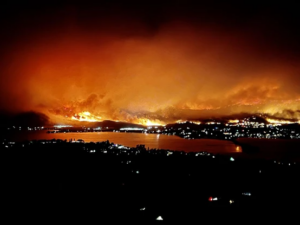
I’m still freaked out. Since 1988, I have tracked and recorded breaking science and weather news around the world. In the past two months, my collection lines overflowed, my system broke down. My brain could not compute. It’s going to take all year just to understand the weather shift that just happened, and how much of it is permanent. But we may not get time for that. After Hurricane Idalia in Florida and super-Typhoon Saola crashed into Hong Kong and the Chinese mainland, and punishing heat storms all over, there will be another, and another. Then it may be Australia’s turn in the barrel, or who knows?
Nature offered us a good-survival niche for 10,000 years, like a kind of peace pact. We broke it – and now we find out what happens.
In the next weeks, I’ve got excellent guests lined up, top experts speaking to you directly about their new work. Plus, there are a couple of plots developing. For example, if we clean up air pollution, would that trigger fatal climate change? Please stay tuned.
I’m Alex Smith. Thank you for listening, and caring about your world – all of it.
I think my trigger this year was the clear evidence of a step-change in the global climate. This crisis is not slowly getting worse year-by-year. It is being forced into a regime of big jumps, especially during strong el nino years, after which the whole thing does not return to “normal”, whatever that means anymore, but stays at the new extreme.
I’ve been trying to tell people that our old world is gone and no one knows what the new world will look like, but its probably not going to be very hospitable.
They usually tune me out.